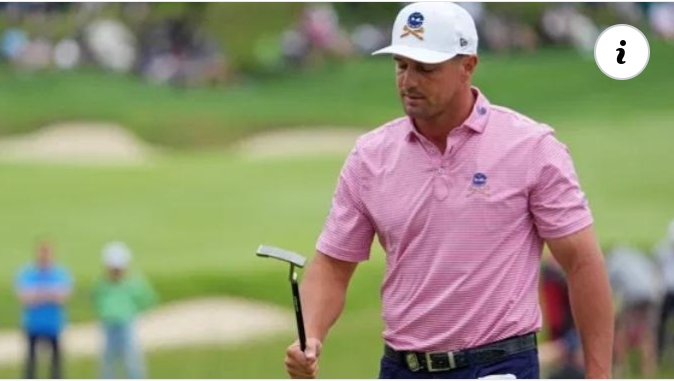Olympics Denied Bryson DeChambeau’s Chance To Overtake Wyndham Clark & Co With a Stubborn Decision
Olympics Denied Bryson DeChambeau’s Chance To Overtake Wyndham Clark & Co With a Stubborn Decision
In the intricate world of golf, where rankings and opportunities often hinge on a fine thread of eligibility and selection, recent decisions have stirred significant debate. One such decision, made by the governing bodies overseeing the Olympics and golf’s world ranking system, has particularly impacted Bryson DeChambeau, a prominent player whose Olympic dreams and chances to gain valuable Official World Golf Ranking (OWGR) points have been thwarted.
Jon Rahm, a leading golfer known for his candid opinions, recently weighed in on the issue of Olympic golf selection criteria. Rahm suggested that the responsibility for selecting players should be left to the individual countries themselves. This opinion highlights a significant point of contention in the ongoing debate over how golfers are chosen to represent their nations at the Olympic Games. While Rahm’s suggestion may seem to advocate for national autonomy, it also underscores an underlying problem with the current system that has directly affected DeChambeau.
DeChambeau, who has been a notable figure in the golfing world, has faced considerable challenges due to his affiliation with LIV Golf. LIV Golf, a series that has disrupted traditional golf’s status quo, has found itself at odds with the traditional golf establishment, particularly in matters related to the OWGR. These restrictions have placed LIV-affiliated players, including DeChambeau, in a difficult position, particularly regarding their ability to earn and accrue OWGR points essential for maintaining high rankings and qualifying for prestigious events.
Despite the hurdles presented by LIV Golf’s contentious relationship with traditional golf circuits, DeChambeau has demonstrated his exceptional skill and perseverance. His triumph at the 2024 US Open, one of golf’s major tournaments, propelled him to the impressive position of #9 in the OWGR. However, even with this notable achievement, DeChambeau was unable to secure a spot in the U.S. Olympic golf team.
The selection process for the Olympic golf tournament is primarily determined by the OWGR, which ranks golfers globally based on their performances in various sanctioned events. For American golfers to be selected for the Olympic team, they must rank among the top four U.S. players in the OWGR. In DeChambeau’s case, despite his remarkable performance and high ranking, he found himself positioned behind Scottie Scheffler, Collin Morikawa, two-time major winner Xander Schauffele, and, rather unexpectedly, Wyndham Clark.
This scenario presents a notable example of how the rigid criteria for Olympic selection can inadvertently sideline highly capable players. DeChambeau’s exclusion from the team not only deprived him of the opportunity to compete in the Olympics but also denied him the potential to earn significant OWGR points. According to recent observations shared by golf analyst Bob Harig, winning a gold medal at the Olympics would have awarded the victor approximately 50 OWGR points. These points are highly valuable, as they can significantly impact a player’s ranking and career trajectory.
Had DeChambeau been part of Team USA and secured the gold medal, he would have been in a position to surpass other prominent golfers, including Wyndham Clark, the 2023 US Open winner. The chance to overtake such competitors and further solidify his place among the top players globally was a missed opportunity due to the stringent selection criteria.
The exclusion of Bryson DeChambeau from the Olympics, despite his exceptional performance and high OWGR ranking, highlights a broader issue within the sport of golf. It underscores how the intersection of national selection criteria and international ranking systems can create barriers for some of the sport’s most talented players. While the debate continues over the fairness and effectiveness of these criteria, it is clear that changes may be necessary to ensure that deserving players are given the opportunities they have earned through their hard work and dedication.
In conclusion, Bryson DeChambeau’s situation illustrates a significant challenge within the world of competitive golf. The rigid application of OWGR-based selection criteria for the Olympics has, in this instance, prevented a skilled player from achieving what could have been a career-defining moment. As the sport evolves and the debate over selection criteria continues, it remains to be seen how these issues will be addressed to better balance fairness, opportunity, and merit in future Olympic Games.
